 Over the years, in my experience keeping chickens, we’ve done both free-ranging and keeping them in a confined coop. My preferred method is to let them free-range, but right now I have our flock separated in pens by breed for breeding purposes.
Over the years, in my experience keeping chickens, we’ve done both free-ranging and keeping them in a confined coop. My preferred method is to let them free-range, but right now I have our flock separated in pens by breed for breeding purposes.
What Is Free-Ranging?
Free-ranging can have a lot of definitions. Some commercial egg companies have been known to stretch the definition of what “access to the outside” really means. But for this article, we’ll call free-ranging;
Providing a coop for your chickens to sleep in, and letting them out in the morning to roam freely around your property. It also may include a commercially processed food supplement.
Pros
Your chickens get to live like chickens
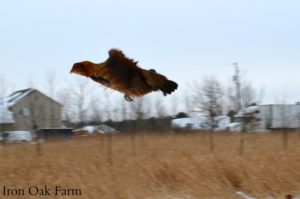 When you let your chickens free-range you will begin to see behavior that doesn’t necessarily occur in a confined coop setting, especially if you have a rooster. He will round up the girls if they stray too far. Different vocalizations will be heard as bits of food are found. Scratching, sand bathing and even relaxing will look different when your chickens are free to roam.
When you let your chickens free-range you will begin to see behavior that doesn’t necessarily occur in a confined coop setting, especially if you have a rooster. He will round up the girls if they stray too far. Different vocalizations will be heard as bits of food are found. Scratching, sand bathing and even relaxing will look different when your chickens are free to roam.
Health
I notice that when our chickens are allowed to free-range, I have fewer problems with things like mite infestations, territorial pecking, worms, and respiratory issues. They also have cleaner, healthier feathers, leg scales, feet, toenails, and beaks.
Better eggs
The yolks in our chicken eggs are more orange and tastier when our chickens are free-ranging.
An article published by Mother Earth News found that chickens raised on pasture had:
- 1⁄3 less cholesterol
- 1⁄4 less saturated fat
- 2⁄3 more vitamin A
- 2 times more omega-3 fatty acids
- 3 times more vitamin E
- 7 times more beta carotene
- 4-6 times more vitamin D compared to store-bought eggs.
Pasture-raised is not the same as free-ranging, but it’s close and definitely presents your flock with healthy natural food selections that transfer to the nutrition of the egg.
Less feed
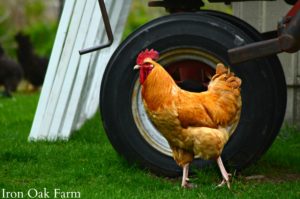 When your chickens are free-ranging, they spend the day scratching and nibbling on plants, weeds, and grass. They gobble up protein-rich worms, beetles and bugs. They also ingest healthy microbes in the soil that help food absorption.
When your chickens are free-ranging, they spend the day scratching and nibbling on plants, weeds, and grass. They gobble up protein-rich worms, beetles and bugs. They also ingest healthy microbes in the soil that help food absorption.
What that means is that they will need less store-bought food.
They don’t need grit
If your chickens are confined to a coop, even with an outdoor run you should provide them with a store-bought grit. Grit is essential to proper digestion.
When chickens free range they will pick up small stones as they would in the wild, so grit is unnecessary.
Cleaner coop
When your chickens spend less time in the coop, it stays cleaner. The egg boxes stay fresher longer, and the eggs themselves are collected with less debris. I also notice the waterers stay cleaner as well, as the scratching impulse is taken outside so less bedding is thrown in the waterer.
You can have a smaller coop
Chickens don’t need as much coop space if they’re only sleeping and laying eggs in the coop.
Fewer bugs in your yard
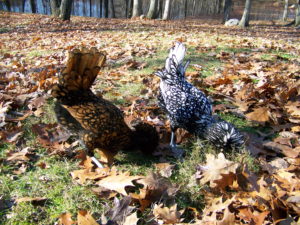 Guinea hens are known for their voracious appetites when it comes to insects, but chickens do a fair job as well. They happily gobble up ticks, mosquitoes, squash bugs, and tomato hornworms.
Guinea hens are known for their voracious appetites when it comes to insects, but chickens do a fair job as well. They happily gobble up ticks, mosquitoes, squash bugs, and tomato hornworms.
Cons
Predator attacks
It’s true that free-ranging opens up your chickens for attacks from wild animals and even dogs. In this situation, I weigh the quality of life of the flock to the threat of an attack. It’s a choice that each chicken keeper has to make, and there is no wrong answer.
Chickens are not completely helpless when it comes to predators. Especially if you keep a rooster. You will notice a certain “booook” noise whenever an overhead predator is spotted. When the rooster makes this noise your chickens will run for cover.
When given the chance to escape they often can successfully. Predator attacks (I’ve found) are more detrimental when the chickens are confined in a less than secure run. The predator gets in and traps the chickens in their own home.
We’ve also noticed that including a pair of geese in our flock greatly reduced the number of predator attacks.
Chickens getting in the road or neighbors yard
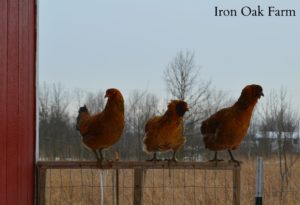 When chickens are allowed to roam freely, they will often pay little attention to human-made borders like property lines, roadsides, etc.
When chickens are allowed to roam freely, they will often pay little attention to human-made borders like property lines, roadsides, etc.
Chicken poop
Most of the time chicken droppings are so spread out in our yard that they sink into the soil and provide great fertilizer for our lawn. But if you have a small yard, sometimes chicken poop will build up in undesirable places.
I made the mistake of feeding our girls treats on our front porch. They then decided that they would just hang out on the porch all day in case I decided to give them a treat. I was constantly hosing and scrubbing off our porch.
You have to lock them up at night.
If your chickens are free-ranging during the day and returning to the coop on their own at dusk, you will have to be home to lock them in securely for the night.
An alternative to this is installing an automatic coop door, which can be programmed to close at a specific time.
They will dig up landscaping
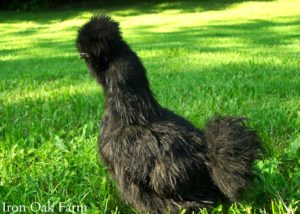 There’s nothing our chickens like better than a fresh layer of mulch around my hostas. They love to scratch it up and spread it everywhere. They also love to eat tender young pea shoots in the garden, and really any small, sweet vegetable or flower. Fencing will have to be used to keep plants safe.
There’s nothing our chickens like better than a fresh layer of mulch around my hostas. They love to scratch it up and spread it everywhere. They also love to eat tender young pea shoots in the garden, and really any small, sweet vegetable or flower. Fencing will have to be used to keep plants safe.












